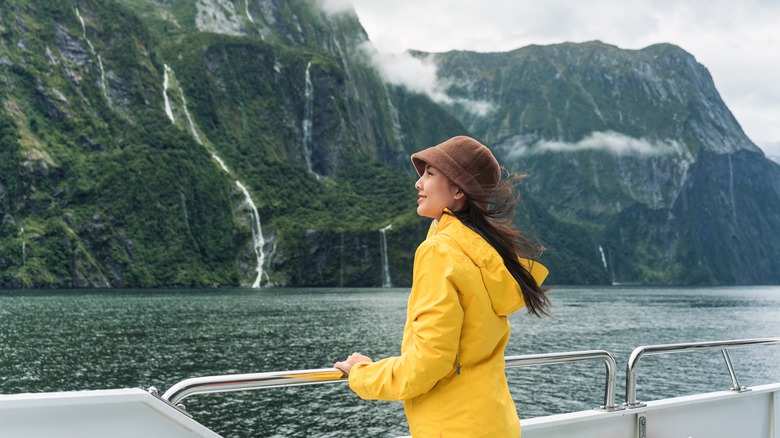New Zealand Opens Its Doors To Digital Nomads And Long-Stay Travelers
What would it be like to work remotely in New Zealand? During the workday, you'd do your regular, digital tasks — designing graphics, day-trading, or programming software — and you'd spend that time glued to your laptop, of course. But you could do this work in a cabin outside New Plymouth, with views of snow-capped Mount Taranaki. Or you could rent a beach house in Raglan and set up your desk so you're overlooking the Tasman Sea. Maybe you'd just rent an apartment in Queenstown, within eyeshot of the waterfront and dramatic mountains all around.
Then you'd close up your computer, throw on some snow pants, and head to the slopes at Cardrona Alpine Resort. Or you could hurl yourself off of Kawarau Bridge, the first-ever commercial bungee jump. Or you could book a weekend getaway to float down the subterranean rivers of Waitomo, admiring bioluminescent glow worms pasted to the cave ceiling.
If you're already a digital nomad, this dream could easily come true, thanks to the special 90-day visas that New Zealand is now offering foreign visitors. The visa itself isn't groundbreaking; just about any U.S. passport holder can stay in New Zealand up to six months, and even nine months is possible with the right stamp. What's new is that digital nomads aren't legally required to pay a resident's tax during that 90-day period. The government opened up applications on January 27, 2025.
How to work remotely from this Pacific paradise
New Zealand is attractive in myriad ways, especially for outdoors enthusiasts and fans of the "Lord of the Rings" movie series, which was filmed among New Zealand's rolling hills, mountains, and fjords. A growing number of foreigners have become interested in Polynesian — and specifically Maori — cultures, and the nation's reputation for hiking, bicycle routes, and extreme sports has made a nearly-14-hour flight from Los Angeles feel absolutely worth it. And there are lots more iconic New Zealand experiences travelers are adding to their bucket lists.
Before you pack your work station, there are a few things to know. To qualify for the remote work visa, you'll have to prove that your job fits the "digital nomad" definition. These kinds of work are wide-ranging, from "answering emails" to "writing reports," but the most important part is that you're not working for a New Zealand-based entity. Meanwhile, content creators and influencers are welcome to produce and edit their material here, yet their work should not "[promote] an activity, event or product for gain or reward from a New Zealand business or person in New Zealand." This can get tricky for vloggers who want to film themselves in, say, fancy hotels and restaurants in the capital of Wellington, but must decline any compensation or gifts.
In truth, New Zealand didn't invent the "digital nomad visa," and no fewer than 66 other countries have similar programs. But it's hard to beat New Zealand's scenery, and English is a pretty convenient national language for Americans. While you're living there, you might try this unique form of travel and lodging.

